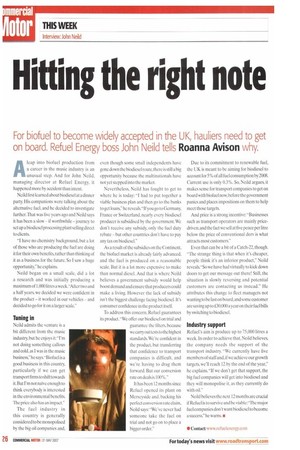Hitting the right note
Page 26

If you've noticed an error in this article please click here to report it so we can fix it.
For biofuel to become widely accepted in the UK, hauliers need to get on board. Refuel Energy boss John Neild tells Roanna Avison why.
Aleap into biofuel production from a career in the music industry is an unusual step. And for John Neild, managing director at Refuel Energy, it happened more by accident than intent Neild first learned about biodiesel at a dinner party. His companions were talking about the alternative fuel, and he decided to investigate further. That was five years ago and Neild says it has been a slow if worthwhile -journey to set up a biodiesel processing plant selling direct to clients.
"I have no chemistry background, but a lot of those who are producing the fuel are doing it for their own benefits, rather than thinking of it as a business for the future. So I saw a huge opportunity," he explains.
Neild began on a small scale, did a lot a research and was initially producing a maximum of 1,000 litres a week."After two and a half years, we decided we were confident in the product it worked in our vehicles and decided to go for it on a larger scale."
Tuning in
Neild admits the venture is a bit different from the music industry, but he enjoys it:"I'm not doing something callous and cold. as I was in the music business," he says."Biofuel is a good business in this country, particularly if we can get transport firms to shift towards it. But I'm not naive enough to think everybody is interested in the environmental benefits. The price also has an impact."
The fuel industry in this country is generally considered to be monopolised by the big oil companies and, even though some small independents have gone down the biodiesel route,there is still a big opportunity because the multinationals have not yet stepped into the market.
Nevertheless. Neild has fought to get to where he is today: "I had to put together a viable business plan and then go to the banks to get loans,he reveals."If you go to Germany, France or Switzerland, nearly every biodiesel producer is subsidised by the government. We don't receive any subsidy, only the fuel duty rebate but other countries don't have to pay any tax on biodiesel."
As a result of the subsidies on the Continent, the biofuel market is already fairly advanced, and the fuel is produced on a reasonable scale. But it is a lot more expensive to make than normal diesel. And that is where Neild believes a government subsidy would help boost demand and ensure that producers could make a living. However the lack of subsidy isn't the biggest challenge facing biodiesel. It's consumer confidence in the product itself.
To address this concern. Refuel guarantees its product. "We offer our biodiesel on trial and guarantee the filters, because we carry out tests to the highest standards. We're confident in the product, but transferring that confidence to transport companies is difficult, and were having to drag them forward. But our conversion rate on deals is 100%."
It has been 12 months since Refuel opened its plant on Merseyside and, backing his perfect conversion rate claim, Neild says: "We've never had someone take the fuel on trial and not go on to place a bigger order," Due to its commitment to renewable fuel, the UK is meant to be aiming for biodiesel to account for 5% of all fuel consumption by 2008. Current use is only 0.3%. So, Neild argues, it makes sense for transport companies to get on board with biofuel now, before the government panics and places impositions on them to help meet those targets.
And price is a strong incentive: "Businesses such as transport operators are mainly pricedriven, and the fact we sell at five pence per litre below the price of conventional dery is what attracts most customers."
Even that can be a bit of a Catch-22, though. "The strange thing is that when it's cheaper, people think it's an inferior product," Neild reveals. "So we have had virtually to kick down doors to get our message out there! Still, the situation is slowly reversing and potential customers are contacting us instead." He attributes this change to fleet managers not wanting to be last on board, and some customer are saving up to £30,000 a year on their fuel bills by switching to biodiesel.
Industry support
Refuel's aim is produce up to 75,000 litres a week. In order to achieve that, Nei Id believes, the company needs the support of the transport industry. "We currently have five members of staff and, if we achieve our growth targets, we'll reach 12 by the end of the year," he explains. "If we don't get that support, the big fuel companies will get into biodiesel and they will monopolise it, as they currently do with oil."
Neild believes the next 12 months are crucial if Refuel is to survive and be viable: "The major fuel companies don't want biodiesel to become a success," he warns. •






















































































































































































